Duration
Morocco Treasures: From the Blue City to the Desert
From $1,600 pp
Bookable From
September - mid-July
Trip Style
Privately Guided
Country
Morocco
Physical Rating
Easy
Overview
Discover treasures of Morocco, from the iconic Blue City, to fascinating medinas, fine gateways, medieval cities, natural parks, and the vast Saraha desert.
Explore kasbahs, spice markets, and vibrant cities on this extensive journey. Mount a camel to traverse the fringes of the Sahara Desert, then marvel at the scenery from the Atlas Mountains' lofty peaks. Immerse yourself in the bustle of imperial cities, navigating souks brimming with unique goods. Cap off this incredible adventure in Akchour National Park to explore the natural water springs. See below for important sustainability notes about camel riding.
Along the way, admire the impressive architecture in time-tested villages and classic cities like Casablanca, Rabat, and Fez. Soak in the rich culture that blends Islamic and African traditions, relax in a traditional Riad, and savor authentic meals to get the most out of this sustainable Moroccan adventure!
Highlights
- Set foot in the architectural marvel of the Hassan II Mosque in Casablanca, perched on the edge of the ocean.
- Wander through Rabat, Morocco’s historic capital, exploring everything from its old medina alleyways and grand citadels to its regal Mausoleums.
- Immerse yourself in the imperial city of Fez, filled with vibrant fragrances and the rhythmic bustle of artisans.
- Travel across the northern middle Atlas, passing serene highlands and lush wild cedar forests on your way to Erfoud, a quaint town surrounded by fortified villages and lush palm groves.
- Experience the ancient rhythms and rituals of pre-Islamic African traditions in the Gnaoua village of Khamlia.
- Embark on a camel ride through the Sahara, watching a breathtaking sunset over the magnificent honey-colored dunes. (Sustainability notes below.)
- Relax in a Riad, savoring local home-cooked meals.
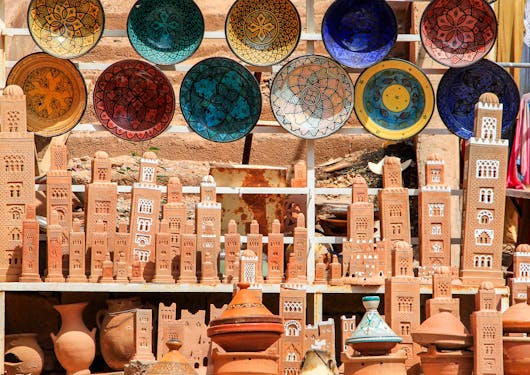
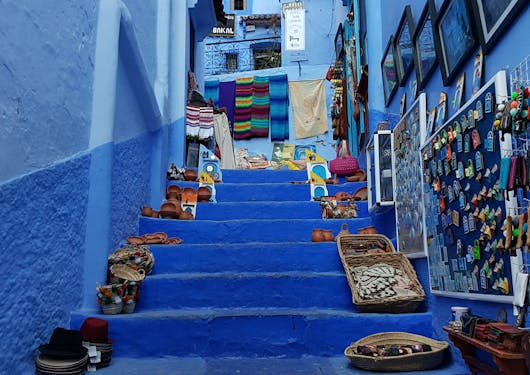
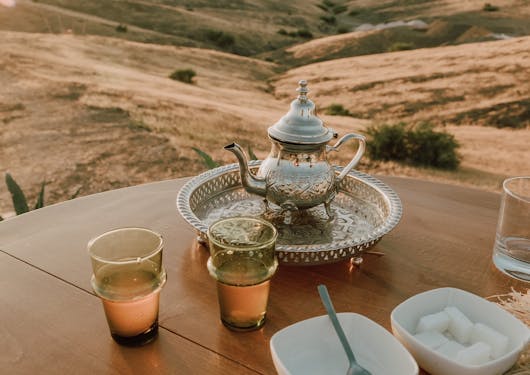
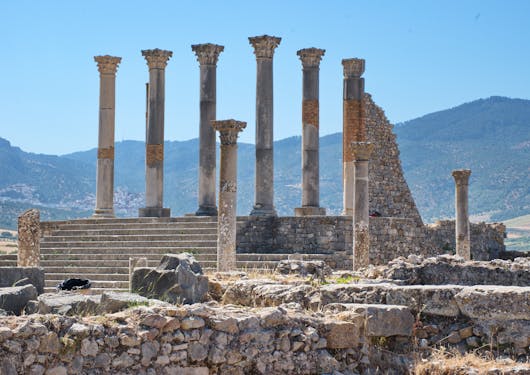
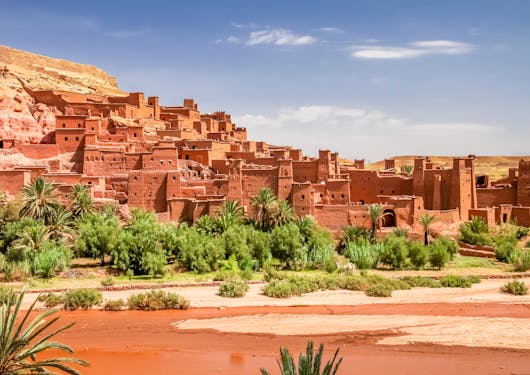
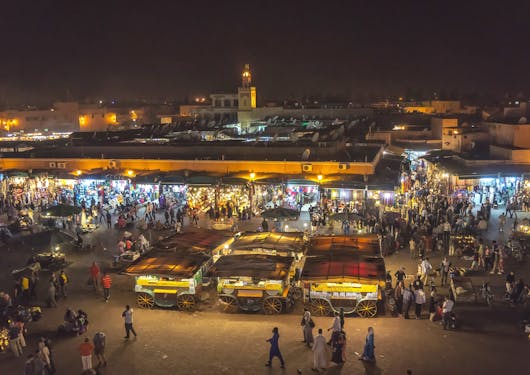
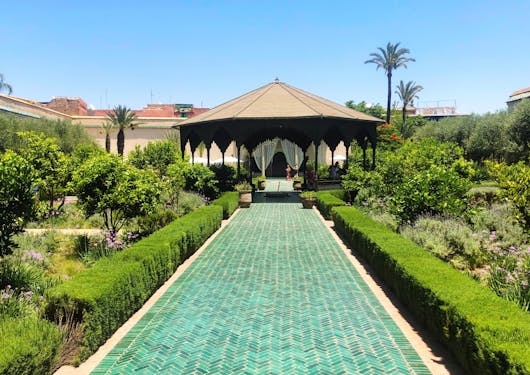
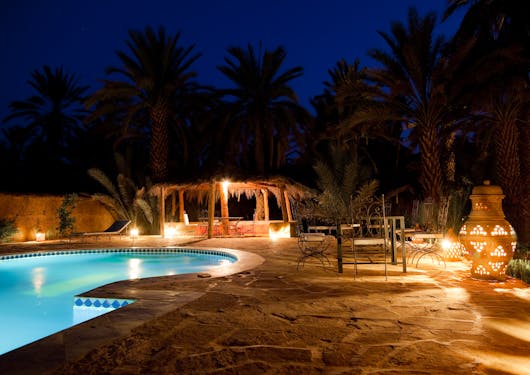
Is riding a camel sustainable?
Riding a camel can be considered sustainable, depending on how it's managed. Here are a few factors to consider. If you are not comfortable with participating in a safari camel trek, you can opt out of this with our full understanding and support.
Animal Welfare: Unlike riding elephants, where the gentle giants are 'broken' and abused to accommodate human riders, camels can be trained humanely, much like horses. They can be domesticated, socialized young, and become accustomed to halters, saddles, and commands. Companies offering camel rides should treat the animals well, feed them properly, and not overwork them.
Environmental Impact: Camels have been a transportation method for humans for thousands of years. They were particularly important for trade and transport in desert areas thanks to their ability to traverse long distances with little water. While now also used for tourism, camels are an important way for visitors to see beautiful, remote natural areas without the use of a motorized car.
Cultural & Economic Implications: Camels are ingrained in the traditional fabric of desert communities. Riding them responsibly can preserve an ancient practice, provide economic support for their owners, and foster respect and appreciation for their importance to locals.
Departure Dates
Seasonal Notes
The best time to visit Morocco is during the autumn (September-November) or early spring (March-April), but Morocco is a year-round destination.
People should avoid August when it can be too hot in the desert and overcrowded in the north by local tourists.
Itinerary
Day 1 Casablanca [Morocco] (Arrival day)
Day 2 Road to the Blue City
Day 3 Hiking in Akchour National Park
Day 4 Cultural Journey to Fez
Day 5 Explore the Medina of Fez
Day 6 Sahara Getaway
Day 7 Sahara Safari
Day 8 Throughout the Kasbahs
Day 9 Explore Marrakesh
Day 10 Casablanca or Marrakesh (departure day)
Customization
Route Map

Inclusions & Exclusions
8 nights of accommodation with breakfast at handpicked, mid-range riads & hotels
1 night of accommodation at a deluxe Sahara Desert Encampment
Breakfast & Dinner in the desert and in Ouarzazate
Private driver & very comfortable car for the duration of trip
Private guides in Rabat, Akchour, Fez, and Marrakech
Cooking class in Fez
Camel trekking to catch the sunset (Optional)
Sahara Safari in 4x4 to discover nomads' life
Traditional music around a campfire in the camp
Tailored pre-departure advice and personalized support
Tree plantation to offset the carbon footprint of your trip
International flights to/from Morocco
Activities, admission fees, and sightseeing not mentioned in the itinerary
Meals not mentioned in the itinerary
Tips & gratuities
Pricing
Prices exclude flights to/from the destination.
Prices are for double room occupancy unless indicated otherwise.
Please request holiday pricing if traveling over a holiday period, including, but not limited to, Christmas, New Year's, and Easter.
For groups with an odd number of travelers, contact us to confirm your preference between a single supplement for a private room and a triple bedroom.
Deposit per person
30% of the trip price
Group of 2 Travelers - price per person
$3,200
Group of 3-4 Travelers - price per person
$2,240
Group of 5-6 Travelers - price per person
$1,920
Group of 7-8 Travelers - price per person
$1,760
Group of 9-10 Travelers - price per person
$1,660
Group of 11-12 Travelers - price per person
$1,600
Payment & Cancellation Policy
This trip is offered from September through mid-July.
At checkout, choose your preferred departure date and pay the deposit. Yugen Earthside’s standard Payment & Cancellation Policy applies.
Book With Confidence
- Your deposit is fully refundable for 30 days when you book 120+ days in advance and pay by bank transfer.
- If you pay by credit card, the card processing fees are non-refundable.
- We’ll confirm availability for your chosen dates within 3 business days. If confirmed, you’re all set! If not, we’ll help you adjust your dates or refund your deposit.
Sustainability
We focus on impactful experiences based on quality, authenticity, and sustainability. Our crew and drivers are all extremely knowledgeable and experienced, and we choose smaller-scale, locally-owned accommodations and boutique hotels.
We buy locally-produced food and drinks and dine in locally-owned restaurants. We strive to minimize plastic waste wherever possible and carefully manage limited energy and water resources. We operate with a ‘leave no trace’ ethos – take only memories, leave only footprints.
Environmental Initiatives
We take you closer to the most remote environmental landscapes of Morocco. We tell you all about the sustainable initiatives done by the local population. For example, we can share how the construction materials keep the houses warm during winter and cold during summer, or about the reusable objects and the agriculture systems.
We make a financial contribution to plant trees in nurseries managed by our partner, High Atlas Foundation, in order to help offset the carbon footprint of our travelers.
Sociocultural Initiatives
This itinerary was designed to offer real-life experiences that promote cross-cultural understanding. We make sure to take you to boutique-owned hotels/riads and restaurants. We support local artisans by witnessing their hard work even in the most remote areas of Morocco.
Economic Initiatives
All our partners are Moroccan and we make sure that we pay them fairly to be sustainable for them. We also make sure to visit remote areas you likely wouldn't find by yourself, and where you could have the most impactful experience. For example, trekking to remote sections of the High Atlas Mountains helps support local communities.
Health & Safety
Be sure you have traveler's insurance.




